Brazil is a vibrant country filled with breathtaking landscapes and bustling cities. From golden beaches to lush jungles, it offers a unique mix of adventure and urban charm. With over 212 million people, it’s a cultural melting pot where traditions from around the world blend seamlessly.
Thinking about making this place your home? The life here is shaped by economic opportunities, rich culture, and warm weather. Whether you’re drawn to São Paulo’s fast pace or Rio’s coastal beauty, there’s something for everyone.
This guide covers essentials like costs, housing, and adapting to local customs. Ready to explore what Brazil has to offer? Let’s dive in.
Key Takeaways
- Brazil blends natural beauty with vibrant urban centers.
- The country welcomes expats with diverse cultural influences.
- Economic opportunities vary across different regions.
- Housing options range from city apartments to beachfront homes.
- Adapting to local customs enhances daily life.
Why Consider Living in Brazil?
From the Amazon’s wild heart to cosmopolitan cities, Brazil dazzles at every turn. Whether you crave adventure or urban energy, this country delivers both in spades.
The Allure of Brazil’s Natural Beauty
Picture 6,000km of beaches, from Copacabana’s lively shores to hidden coves. The Amazon rainforest, covering 39% of the land, shelters 10% of the world’s species—like playful pink river dolphins.
UNESCO gems like Iguaçu Falls and the Pantanal Wetlands add to the magic. Hike through jungles, surf legendary waves, or unwind in eco-lodges. Outdoor activities here are endless.
A Cultural Melting Pot
Brazil’s culture is a rich blend of traditions. Nearly half the population identifies as Pardo (mixed heritage), with African, European, and Indigenous roots shaping music, food, and festivals.
- Rio Carnival: A whirlwind of samba, costumes, and joy, drawing millions yearly.
- Saudade: A unique mix of nostalgia and hope, woven into daily life.
- Language: Portuguese thrives alongside 274 Indigenous languages.
Expats find a warm community in cities like São Paulo, where international schools and social clubs ease the transition.
Living in Brazil: What to Expect
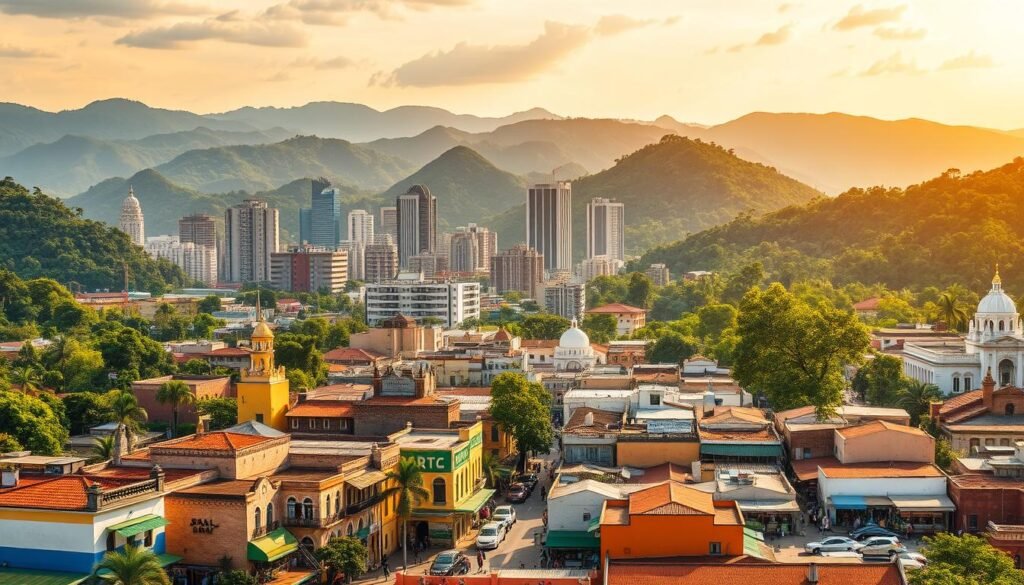
Brazil’s diverse cities and climates shape daily experiences in unique ways. Whether you prefer skyscrapers or shorelines, each region has its own rhythm.
The Pace of Life in Different Cities
São Paulo, contributing 34% of the national GDP, buzzes with business. Meetings start punctually, and workweeks are fast-paced. In contrast, Florianópolis blends island life with tech hubs—think laptops on the sand.
Rio balances energy and ease. Mornings are for work; afternoons invite beach volleyball. Smaller areas like Belo Horizonte offer a middle ground—urban perks with community vibes.
Weather and Climate
Northern areas are tropical, with highs near 30°C (86°F) year-round. The Amazon sees heavy rain from June to September. Southern states have milder winters, even occasional frost.
Rio’s summers sizzle, while Brasília boasts 2,363 sunshine hours annually. Pack for humidity in coastal cities and layers for São Paulo’s cooler evenings.
Cultural Rhythms
*Brazilian time* rules social plans. Dinners start late, and weekends mean feijoada lunches or samba nights. Football unites the nation—join locals for matches.
- Outdoor culture: Weekly beach volleyball, churrasco grilling.
- Rainy seasons: December–March in Rio; June–September inland.
Cost of Living in Brazil
Budgeting in Brazil can be surprisingly affordable compared to Western standards. A single expat might spend 40% less here than in the UK, with rent in major cities like São Paulo averaging just $286/month for a one-bedroom apartment.
Comparing Brazil to the US and UK
Groceries cost 30% less than in the US, but electronics run 20% higher. A family of four needs around $3,500/month for a comfortable lifestyle, including private school fees. “Condomínio” fees (amenity charges) add $100–$400 monthly to housing costs.
Monthly Budget Breakdown
- Housing: $286–$4,193 (varies by location and size)
- Utilities: $90–$150 for internet, electricity, and water
- Transport: $242/month for public transit passes
“Currency volatility matters. Transferring funds during strong Real periods maximizes your budget.”
Hidden Costs to Watch For
Rental contracts often include a 15% taxa de serviço (service fee). Imported goods face a 10% IVA tax. Rio is 23% pricier than Belo Horizonte, so location impacts your budget.
Housing in Brazil: Renting vs. Buying
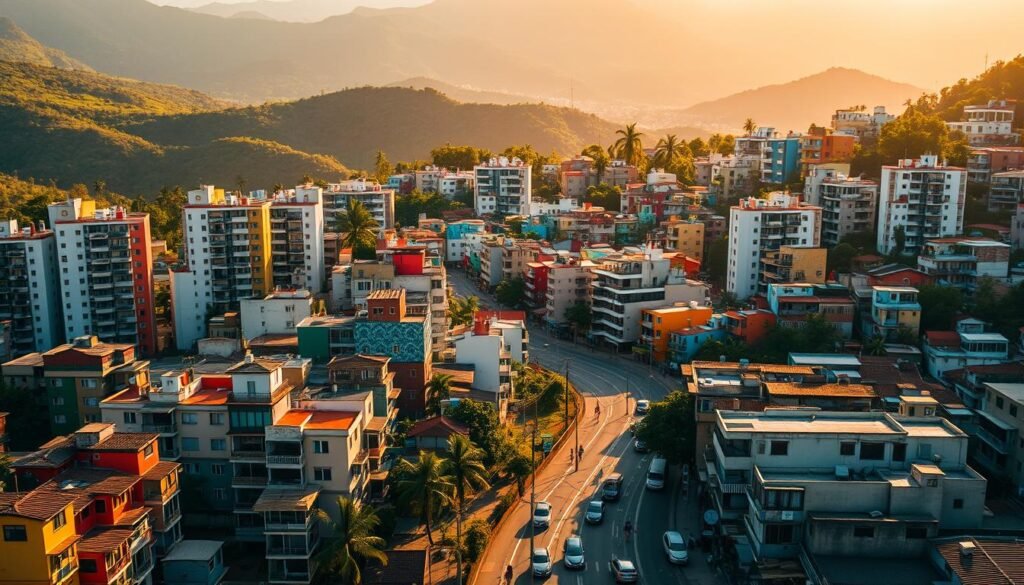
Finding your perfect home in Brazil offers exciting choices between urban energy and coastal charm. Whether you prefer a high-rise in São Paulo or a beachfront condo in Rio, the market caters to diverse budgets. Here’s how to navigate your options.
Popular Neighborhoods for Expats
Vila Madalena in São Paulo blends artsy vibes with nightlife, averaging $1,200/month for a one-bedroom. In Rio, Barra da Tijuca attracts expats with its 20% international community and modern amenities.
Emerging areas like Natal offer 8% annual appreciation, while Florianópolis balances island life with affordability. Coastal zones restrict purchases within 100m of the shore, so research local laws.
Understanding Rental Agreements
Standard leases run 30 months, requiring a fiador (local guarantor) or seguro-fiança (insurance). Platforms like QuintoAndar simplify searches, but always verify:
- Documents: CPF (tax ID) and proof of income.
- Security: Upscale condos feature 24/7 portaria (concierge).
- Costs: Furnished units cost 35% more than unfurnished.
| Option | Pros | Cons |
|---|---|---|
| Renting | Flexibility, lower upfront costs | Lease terms, annual adjustments |
| Buying | Long-term investment, equity | High taxes (3–5% ITBI), cash-heavy |
“Foreign buyers often pay cash—mortgages are rare without residency.”
Healthcare in Brazil
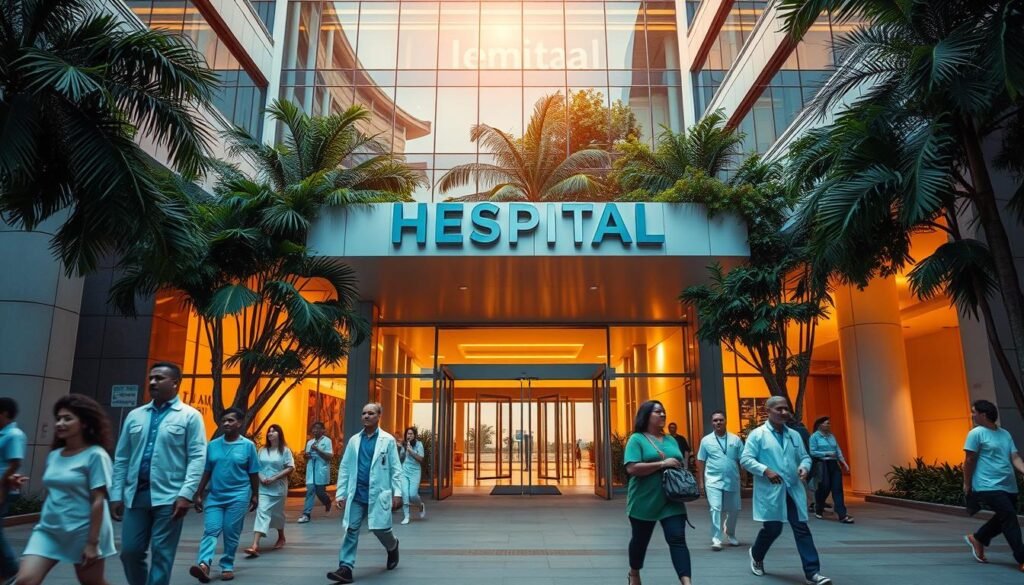
Navigating healthcare here means understanding two parallel systems—one public, one private—each with distinct advantages. The SUS (Sistema Único de Saúde) provides free coverage to 70% of residents, while private plans offer faster access to specialists. Your choice depends on budget, location, and needs.
Public vs. Private Healthcare
Brazil’s public health system excels in preventive care. SUS offers free vaccines, emergency services, and maternal health programs. Infant mortality rates dropped 77% since 1990 thanks to SUS initiatives.
Private healthcare shines in speed and specialization. Top hospitals like Albert Einstein rank globally. Plans cost $150–$400/month, covering dental, labs, and air ambulance transfers.
| Aspect | Public (SUS) | Private |
|---|---|---|
| Cost | Free | $150–$400/month |
| Wait Times | Weeks for specialists | Days or same-day |
| Coverage | Basic care, emergencies | Elective surgeries, luxury facilities |
Navigating the Health System
- Pharmacies: Farmácia Popular gives 90% discounts on chronic meds.
- Dental tourism: Cleanings cost 40% less than in the US.
- Telemedicine: Permanent since 2022, ideal for rural areas.
“Always verify if your private plan covers repatriation. Rural expats may need air ambulance riders.”
COVID-19 response highlights SUS resilience—87% vaccination rates. The Mais Médicos program added 13,000 foreign doctors to underserved regions. For family care, private networks like Amil provide English-speaking pediatricians.
Education Options for Expats
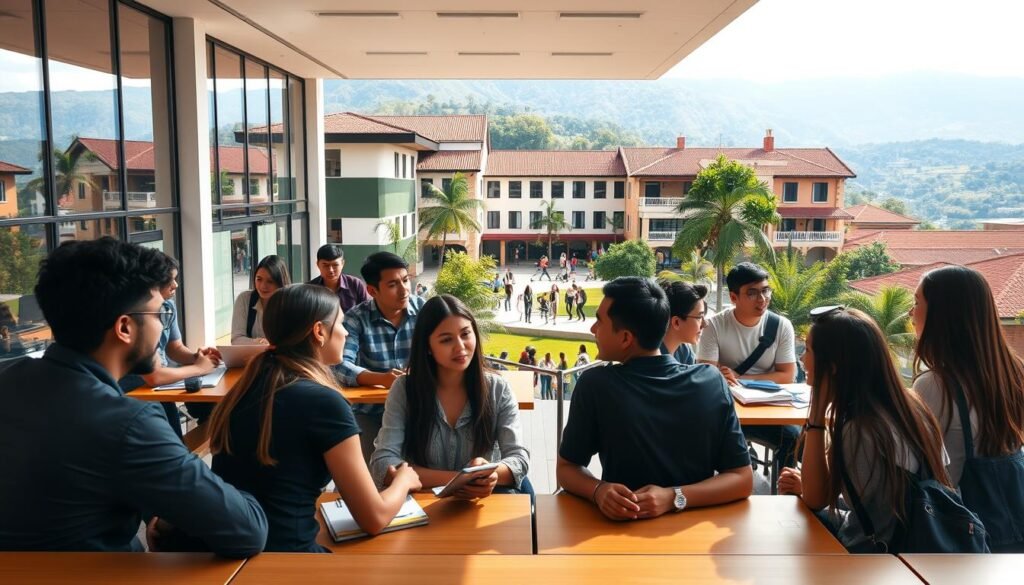
Choosing the right school for your children is crucial when relocating. The education system here offers diverse paths, from public institutions to elite international schools. Understanding these options helps you make informed decisions for your family’s future.
Public vs. Private Schools
Public schools teach exclusively in Portuguese and require language proficiency exams for enrollment. While free, they face challenges like overcrowded classrooms and limited resources. Only 69% of students complete secondary education through this system.
Private institutions offer smaller classes and enhanced facilities. Many provide bilingual programs or religious-based curricula. Annual costs range from $5,000-$15,000, making them accessible to middle-class families.
International Schools in Major Cities
Top-tier international schools like Graded School in São Paulo charge $25k/year but deliver globally recognized standards. These institutions create tight-knit community networks for expat families.
- Curriculum choices: IB programs at Chapel School vs American diplomas at Escola Americana
- Language support: Escola Beit Yaacov’s Hebrew-Portuguese immersion
- Security features: 24/7 guards and biometric access in Rio’s British School
| School Type | Avg. Cost | Key Benefit |
|---|---|---|
| Public | Free | Cultural immersion |
| Private | $5k-$15k/year | Bilingual options |
| International | $15k-$30k/year | Global curriculum |
“Most expat families choose international schools for seamless academic transitions. The IB diploma opens doors worldwide.”
After-school services enrich the experience, from coding academies to capoeira classes. Remember that homeschooling violates 2018 education laws – formal enrollment is mandatory for children aged 4-17.
Visa Requirements for Moving to Brazil

Securing the right visa is your first step toward calling this vibrant country home. Whether you’re planning to work remotely, retire, or invest, understanding the options saves time and hassle.
Exploring Visa Pathways
Brazil recently updated its terminology—“permanent” visas are now called “indeterminate.” These are your main choices:
- Digital Nomad Visa: Requires $1,500/month income proof. Perfect for remote workers.
- Retirement Visa: Needs $2,000/month minimum pension. No age restrictions apply.
- Investor Visa: $280k minimum investment in urban properties or businesses.
Marriage visas take two years to process, while family reunification offers faster approval.
Navigating the Application Process
Start at a Brazilian consulate—Porto Alegre processes applications 40% faster than NYC. You’ll need:
- Apostilled FBI background check
- Completed DS-160 form
- Proof of financial means
“Always apply for temporary residency within 90 days of arrival. Overstaying costs $8/day plus potential bans.”
The government processes most visas in 5-30 days. After arrival, visit Federal Police for your CRNM card (R$204.77 fee). Temporary permits last two years before converting to indeterminate status.
| Visa Type | Key Requirement | Processing Time |
|---|---|---|
| Nomad | Income proof | 10 days |
| Investor | $280k+ investment | 30 days |
| Retirement | Pension statements | 15 days |
Consular services vary by location—check if your embassy offers online submissions. Remember: tourist visas can convert to residency under specific conditions.
Finding Work in Brazil
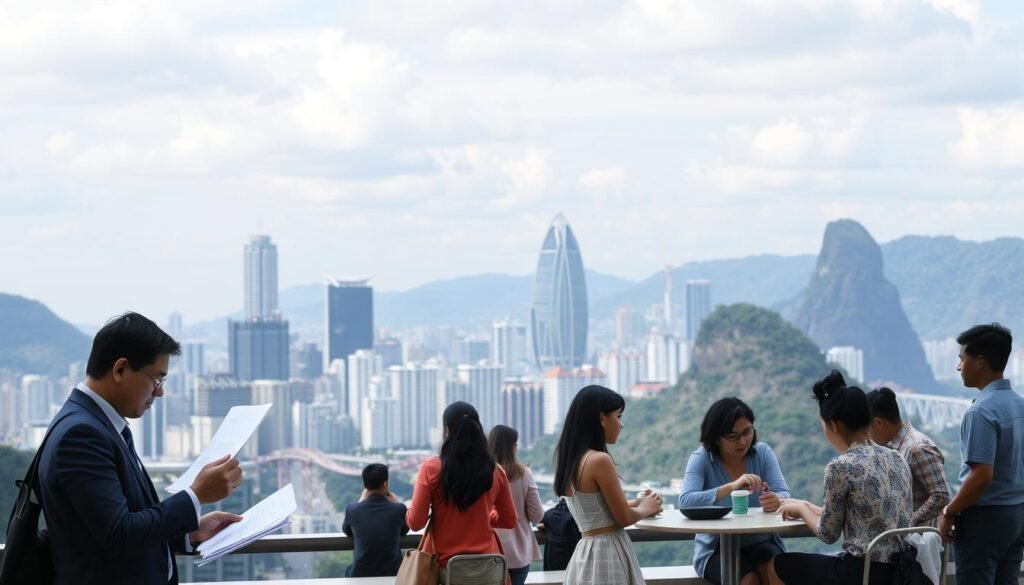
With a growing tech sector and energy boom, Brazil offers diverse career paths for expats. The unemployment rate sits at 8.3% (2023), while tech jobs expand by 9% yearly. Cities like São Paulo and Macaé—home to 60k oil/gas workers—are hotspots for foreign talent.
Job Market Overview
Portuguese fluency is key—66% of roles must go to locals, but bilinguals thrive in multinationals. Remote work is rising, but watch for double taxation treaties. The startup scene in Florianópolis, dubbed the “Brazilian Silicon Valley,” welcomes innovators.
Popular Industries for Expats
These fields hire globally minded professionals:
- Tech: Python developers and ESG consultants are in demand.
- Energy: Macaé’s oil/gas sector needs engineers.
- Education: International schools seek English teachers.
“Update your LinkedIn with a formal photo—Brazilian recruiters prioritize professionalism.”
Freelancers face hurdles like *MEI* registration limits (R$81k/year). For networking, join AmCham events or Rotary Clubs. Job sites like VAGAS and Catho list openings, while Snaphunt caters to expats.
| Strategy | Tip |
|---|---|
| Networking | Attend industry meetups in São Paulo. |
| Visa | Employer sponsorship is common—plan ahead. |
Banking and Finances
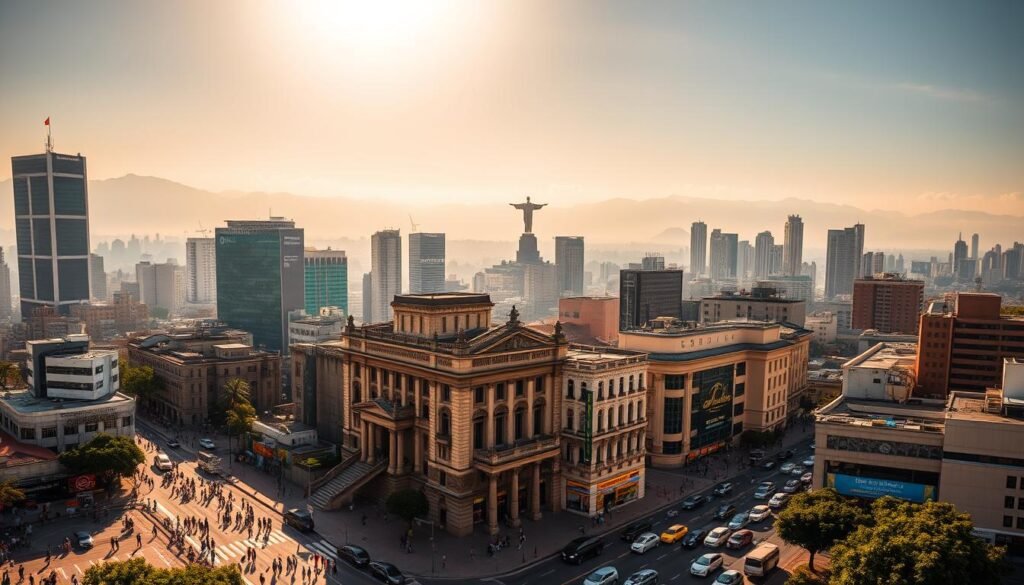
Brazil’s financial landscape blends modern digital solutions with traditional banking customs. Whether you’re managing day-to-day expenses or planning long-term investments, understanding the system ensures smooth transactions. From account fees to tax filings, here’s what expats need to know.
Opening a Bank Account
Traditional banks like Itaú charge around R$50 per month, while digital options like Nubank offer fee-free accounts. You’ll need a CPF (tax ID), proof of address, and a valid visa. Some branches require appointments, so check online first.
Digital banks simplify the process with apps, but international services vary. Compare features:
- C6 Bank: Free international transfers.
- Banco Inter: Low-cost investment platforms.
“Use Casas Bahia store cards to build credit—approval is easier than with major banks.”
Taxes for Expats
Brazil uses a progressive tax bracket system, ranging from 7.5% to 27.5%. Stay over 183 days in a year, and you’ll qualify as a tax resident. File annually via the *Declaração de Imposto de Renda*.
Key considerations:
| Income (BRL/year) | Tax Rate |
|---|---|
| Up to 22,847 | 0% |
| 22,848–33,919 | 7.5% |
Wire transfers cost 1–5% in fees. For better exchange rates, platforms like Wise bypass traditional markups. Always declare cash over $10k at customs.
Safety in Brazil: What You Need to Know
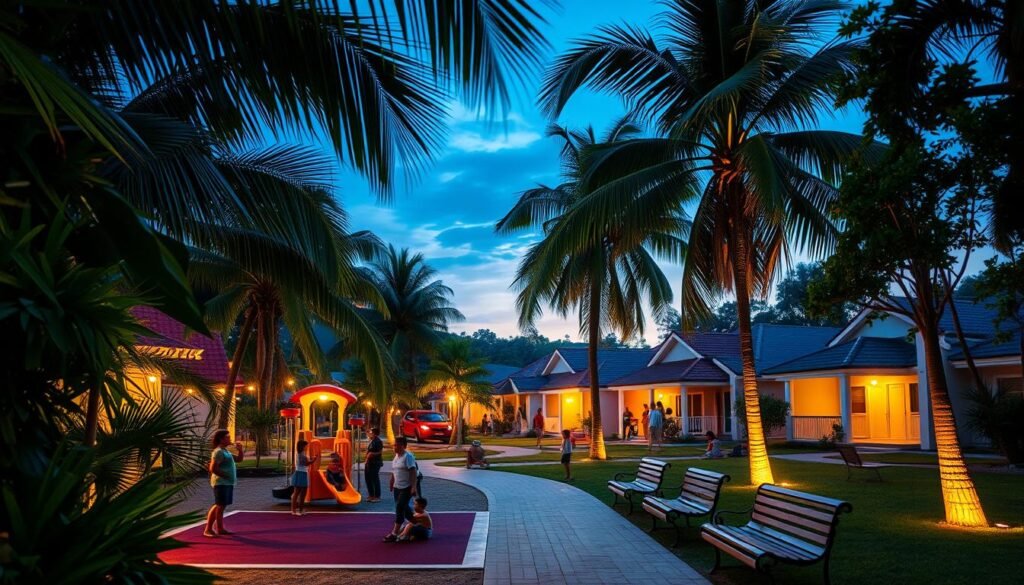
Staying safe requires awareness of regional risks and smart precautions. While Brazil’s homicide rate (22.4 per 100k) exceeds the U.S. (6.3), safety varies widely by location. São Paulo, the safest capital at 6.7/100k, contrasts sharply with high-crime zones.
Crime Rates and Smart Precautions
Tourist police units like DEAT/PAF patrol popular *areas*, but vigilance is key. Use apps like *Onde Tem Tiroteio* for real-time shooting alerts. Carjackings are reduced with anti-shatter window film—common in major *cities*.
- Neighborhood rankings: Higienópolis (safe) vs. Complexo do Alemão (avoid).
- LGBTQ+ safety: Frei Caneca Street welcomes all; rural zones may pose risks.
- Scams Fake police ID checks target tourists—verify badges at stations.
Safe vs. Risky Zones
U.S. Embassy warnings highlight no-go *areas* within 93 miles of borders. Even guided favela tours carry risks. Stick to well-lit streets and avoid buses after dark.
| Area Type | Safety Tips | Emergency Contacts |
|---|---|---|
| Urban Centers | Use ride-shares, not taxis | 190 (Police) |
| Beaches | Hide valuables in waterproof pouches | 192 (Ambulance) |
“GPS navigation prevents wrong turns into dangerous *areas*. Always pre-check routes.”
Your *home* should have reinforced doors and 24/7 *community* patrols if possible. Enroll in STEP for U.S. Embassy alerts. With planning, you can enjoy this vibrant *country* securely.
Transportation and Getting Around
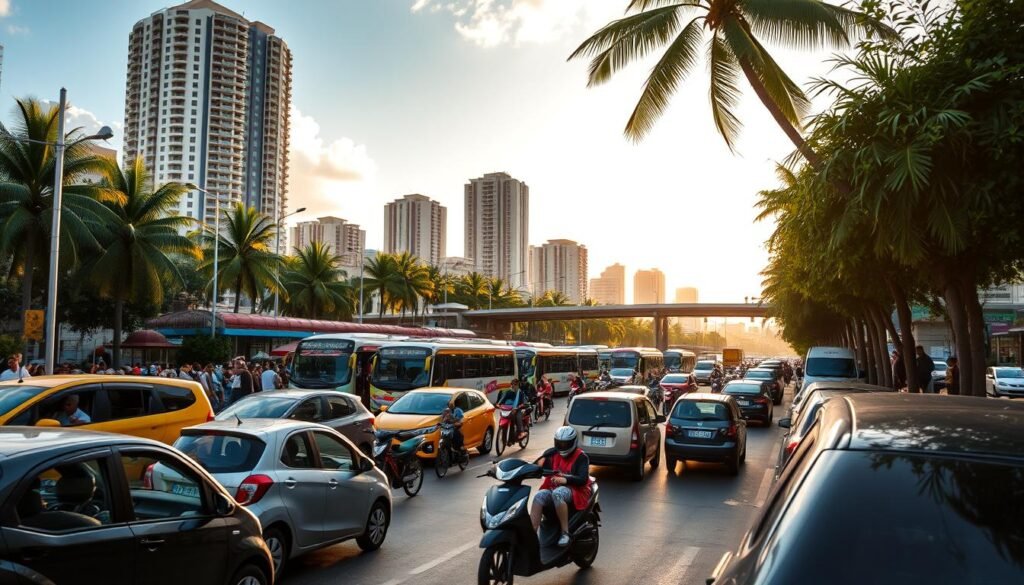
Mobility options in this South American nation range from high-speed metros to scenic ferry rides. Whether you’re commuting in cities or exploring remote areas, understanding the transport network saves time and money. Each region offers distinct solutions tailored to local geography and lifestyle needs.
Public Transport Networks
São Paulo’s metro leads with 89 stations connecting business districts. The system operates from 4:40 AM to midnight, with fares starting at R$4.40. For longer distances, executive buses offer reclining seats and WiFi—Rio to São Paulo costs R$80.
Unique solutions exist across the country:
- Curitiba’s RIT: Bus rapid transit with dedicated lanes and tube stations
- Amazon ferries: Primary transport between riverside communities
- Tembici bikes: 260+ sharing stations in Rio/São Paulo
Driving Considerations
Gas prices hover at R$6.80/liter ($5.20/gallon), making car ownership expensive. The BR-116 highway charges frequent tolls—budget R$50 for a 300km trip. Foreign licenses work for 30 days; conversion requires:
- Medical and psychological exams
- Written test on local traffic laws
- Practical driving assessment
“Ride-hailing services like 99Taxi often undercut Uber by 15%. Always compare surge pricing before booking.”
| Option | Cost | Best For |
|---|---|---|
| Metro | R$4.40-7.00 | Urban commutes |
| Intercity Bus | R$80-150 | Budget travel |
| Car Rental | R$120/day | Remote exploration |
Domestic flights connect major hubs but expect delays. Azul Airlines serves 100+ destinations, with priority boarding for families. For the license conversion part, start early—processing takes 30+ days in most states.
Brazilian Culture and Social Life
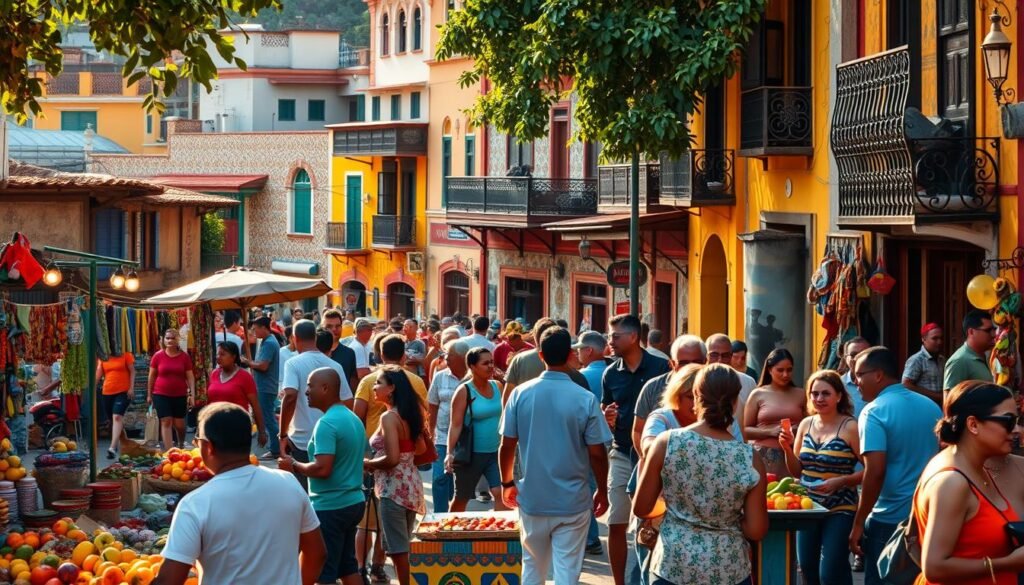
Brazilian social life thrives on warmth, connection, and vibrant traditions. Despite 56% of expats rating personal safety negatively (InterNations), 73% believe their quality of life improves yearly here (Edelman). This contrast highlights how people prioritize relationships over logistical challenges.
Making Friends as an Expat
Conversations flow easily when you mention football or popular novelas. Locals appreciate attempts at piadinhas—playful wordplay jokes. Avoid politics early on; stick to lighter topics like:
- Festivals: Ask about plans for Carnaval or Festa Junina
- Music: Samba and bossa nova make great icebreakers
- Food: Compliment pão de queijo (cheese bread)
Local Customs and Etiquette
Greetings set the tone. Men shake hands with steady eye contact, while women typically kiss cheeks—starting left, then right. Bring a small gift when invited to homes, but avoid:
“Purple flowers symbolize mourning, and sharp objects suggest severed ties—stick to chocolates or wine.”
| Situation | Protocol |
|---|---|
| Dinner parties | Arrive 15-30 minutes late; hosts expect it |
| Business meetings | Handshakes only, no cheek kisses |
Family gatherings often include extended relatives. Expect lively debates and shared dishes. Utensils stay in the “finished” position (knife and fork parallel) when done eating.
Traditional activities like Festa Junina unite community members with square dancing and corn-based treats. These events showcase Brazil’s rich culture of blending indigenous, African, and Portuguese influences.
Food and Dining in Brazil
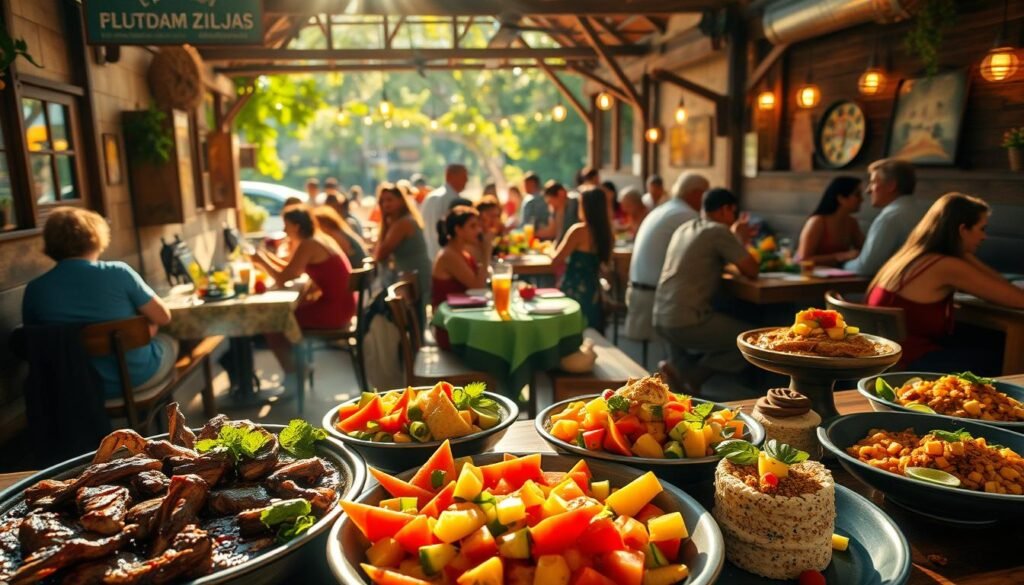
Exploring Brazilian cuisine reveals a world of bold flavors and traditions. Meals here are a vibrant part of daily culture, whether enjoyed at bustling markets or home kitchens. You’ll discover regional specialties and modern twists on classic dishes.
Must-Try Dishes
Start with feijoada—a hearty stew served on Wednesdays nationwide. Black beans simmer with pork cuts for hours, creating Brazil’s national dish. Pair it with orange slices to cut the richness.
Coastal places like Bahia serve acarajé—fried bean cakes stuffed with shrimp. Inland, try barreado, a slow-cooked beef specialty from Paraná. Don’t miss these iconic bites:
- Street food: Crispy coxinha (chicken croquettes) for R$5
- Sweet treats: Brigadeiros at family gatherings
- Drinks: 60+ artisanal cachaça varieties for caipirinhas
Eating Out vs. Cooking at Home
Dining out averages R$40 ($7.50) per meal. São Paulo’s Mercado Municipal offers legendary mortadella sandwiches—arrive early to avoid lines. Tipping 10% (couvert artístico) covers service charges.
“Late dinners bond communities. Restaurants fill around 8:30 PM as family and friends reunite over shared plates.”
Home cooking costs 30% less. Stock up at local markets for fresh tropical fruits and pão de queijo ingredients. iFood dominates deliveries with 15-minute response times in major cities.
| Option | Pros | Cons |
|---|---|---|
| Eating Out | Social activities, no cleanup | Higher costs, limited diet options |
| Cooking | Budget-friendly, customizable | Time-intensive prep work |
Gluten-free adaptations thrive here—even traditional cheese bread gets a celiac-safe makeover. Whether you’re grilling at home or sampling rodízio steakhouses, every meal tells a story.
Popular Expat Destinations in Brazil
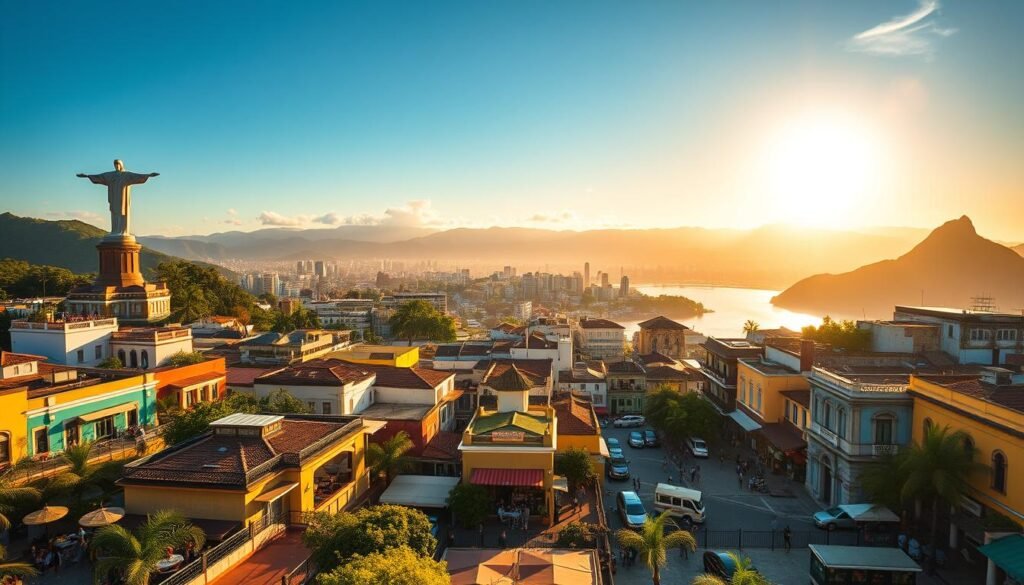
Expats find diverse lifestyles across Brazil’s urban and coastal gems. Whether you seek business opportunities or beachfront relaxation, these places offer distinct advantages. Your ideal location depends on career goals, budget, and preferred pace of life.
São Paulo: The Business Hub
With a $220 billion GDP, São Paulo drives Brazil’s economy. The Jardins district attracts executives with luxury condos, while Vila Olímpia buzzes with startups. Over 12.4 million residents create a thriving international community.
Key advantages:
- 40+ multinational headquarters
- Best international schools in the country
- Vila Madalena’s arts scene balances work and play
Rio de Janeiro: Beaches and Vibrancy
Rio janeiro blends urban energy with natural beauty. Barra da Tijuca’s safety record (vs Centro’s 24.5/100k crime rate) makes it popular. The UNESCO-listed historic center showcases Portuguese architecture.
Local perks include:
- 6.78 million residents create endless social options
- Copacabana and Ipanema beaches minutes away
- Annual Carnival draws global visitors
Florianópolis: A Hidden Gem
This island city boasts an impressive 0.847 HDI score. Lagoa da Conceição’s expat community enjoys water sports and tech jobs. With just 2.26 million residents, it offers small-town charm with urban conveniences.
Why locals love it:
- UNESCO City of Gastronomy status
- 42 beaches within 30 minutes
- Growing digital nomad scene
| City | Best For | Avg. Rent (1BR) | Unique Draw |
|---|---|---|---|
| São Paulo | Career growth | $1,200 | Vibrant cultural mix |
| Rio janeiro | Work-life balance | $900 | Iconic landmarks |
| Florianópolis | Quality of life | $650 | Nature access |
“Emerging hubs like Belo Horizonte’s tech park offer alternatives to traditional expat places. Coastal towns like Paraty provide quieter settings.”
Campinas’ research institutes and Trancoso’s boutique hotels show Brazil’s regional diversity. Each area plays a part in creating options for every lifestyle.
Challenges of Living in Brazil
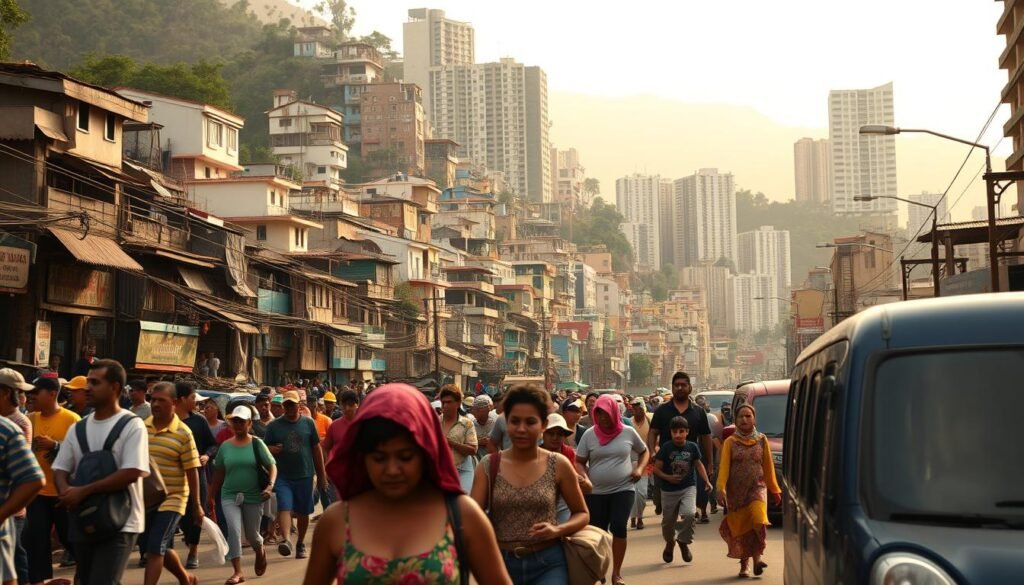
Adapting to life in this South American gem comes with unique hurdles. While the vibrant culture and natural beauty captivate, practical obstacles like language differences and complex paperwork test newcomers’ patience. Understanding these challenges helps you prepare effectively.
Language Barriers
Portuguese ranks among the world’s most complex languages, requiring 600-750 study hours for basic fluency. Regional accents like Carioca (Rio) and Paulista (São Paulo) add another layer of difficulty. Daily tasks become puzzles without key phrases.
These strategies help bridge communication gaps:
- Focus on essentials first: Master greetings, numbers, and directional phrases
- Use tech aids: Apps like Duolingo or local language exchange meetups
- Embrace mistakes: Locals appreciate effort over perfection
“Many expats find verb conjugations the toughest part. Start with present tense—you’ll cover 80% of daily conversations.”
Bureaucracy and Red Tape
Brazil’s administrative system moves at its own pace. Simple tasks like opening bank accounts or receiving packages trigger unexpected delays. The Receita Federal (tax authority) routinely holds international shipments for weeks.
Common bureaucratic hurdles include:
- CPF number requirements: Essential for everything from phones to apartments
- Document legalization: A 2-4 month process for foreign paperwork
- Banking nuances: TED transfers clear same-day; DOC takes 48 hours
| Challenge | Workaround |
|---|---|
| Slow processes | Hire a despachante (paperwork specialist) |
| Cultural fatigue | Adjust expectations for “Brazilian time” |
The jeitinho brasileiro (creative problem-solving) often helps navigate roadblocks. While frustrating initially, most expats adapt within two years. Building local connections proves invaluable for smoothing the transition.
Conclusion
Your adventure in this vibrant country starts with smart planning and cultural openness. While costs are lower than many Western nations, prepare for paperwork challenges like CPF registration and visa processes.
Making this place your home works best when you engage with local communities. Join language exchanges or expat groups to build your network. Brazilians welcome newcomers warmly when you show genuine interest in their culture.
Before you go, check these essentials:
- Secure health coverage—private plans start at $150/month
- Learn basic Portuguese phrases for daily life
- Bookmark embassy contacts and expat forums
Ready to apply? Digital nomad visas require $1,500 monthly income proof. For other options, consult Brazilian consulates in your area.
Soon, you could be dancing at Carnival or discovering hidden beach coves. The rewards here outweigh the hurdles for those who prepare well. Start your journey today!
